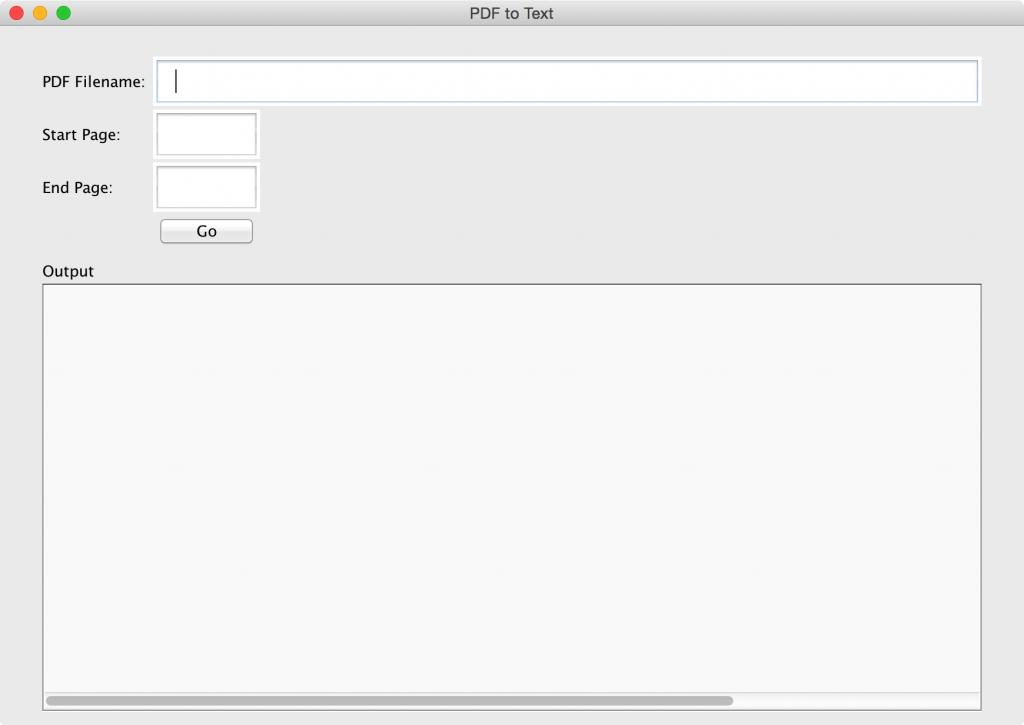By Alvin Alexander. Last updated: June 4, 2016
If you ever need to use a JGoodies FormLayout and PanelBuilder, and want to fill and grow components both vertically and horizontally, I hope the following code is helpful:
package com.alvinalexander.pdftotext
import com.jgoodies.forms.layout.FormLayout
import com.jgoodies.forms.builder.PanelBuilder
import com.jgoodies.forms.layout.CellConstraints
import javax.swing._
import java.awt._
import java.awt.event.ActionListener
import java.awt.event.ActionEvent
class MainFrame extends JFrame {
val filenameLabel = new JLabel("PDF Filename:")
val pageStartLabel = new JLabel("Start Page: ")
val pageEndLabel = new JLabel("End Page: ")
val outputLabel = new JLabel("Output")
val pageStartField = new BetterLookingTextField(4)
val pageEndField = new BetterLookingTextField(4)
val filenameField = new BetterLookingTextField(40)
val outputArea = new JEditorPane
val scrollPane = new JScrollPane(outputArea)
val goButton = new JButton("Go")
filenameField.setText("/Users/al/Desktop/Scala-Cookbook.pdf")
pageStartField.setText("22")
pageEndField.setText("26")
setTitle("PDF to Text")
getContentPane.add(buildInputPanel)
configureOutputArea
initializePreferredScreenSize
pack
private def initializePreferredScreenSize {
val screenSize = Toolkit.getDefaultToolkit.getScreenSize
val desiredHeight = screenSize.height * 4/5
val desiredWidth = screenSize.width * 4/5
setPreferredSize(new Dimension(desiredWidth, desiredHeight))
}
private def buildInputPanel: JPanel = {
val layout = new FormLayout(
"9dlu, pref, 3dlu, pref, 3dlu, pref:grow, 9dlu", //columns
"6dlu, 1px, p, 2dlu, p, 2dlu, p, 2dlu, p, 6dlu, p, 2dlu, fill:pref:grow, 9dlu" //rows
)
val builder = new PanelBuilder(layout)
builder.setDefaultDialogBorder
val cc = new CellConstraints
builder.add(filenameLabel, cc.xy (2, 3))
builder.add(filenameField, cc.xyw(4, 3, 3))
builder.add(pageStartLabel, cc.xy (2, 5))
builder.add(pageStartField, cc.xy (4, 5))
builder.add(pageEndLabel, cc.xy (2, 7))
builder.add(pageEndField, cc.xy (4, 7))
builder.add(goButton, cc.xy (4, 9))
builder.add(outputLabel, cc.xy (2, 11))
builder.add(scrollPane, cc.xyw(2, 13, 5))
return builder.getPanel
}
private def configureOutputArea {
outputArea.setPreferredSize(new Dimension(550, 360))
outputArea.setEditable(false)
outputArea.setMargin(new Insets(20, 20, 20, 20))
outputArea.setFont(new Font("Monaco", Font.PLAIN, 13))
outputArea.setBackground(new Color(250, 250, 250))
}
}
The image below shows the UI that this code creates. As you can see from the image and the code, both the filenameField and outputArea fill and grow as the JFrame is resized.

I won’t add any discussion here, but if you dig through the image and code, especially this line of code:
val layout = new FormLayout(
"9dlu, pref, 3dlu, pref, 3dlu, pref:grow, 9dlu", //columns
"6dlu, 1px, p, 2dlu, p, 2dlu, p, 2dlu, p, 6dlu, p, 2dlu, fill:pref:grow, 9dlu" //rows
)
you’ll see what needs to be done to make the components fill and grow, both horizontally (the textfield and output area) and vertically (the output area gets taller as the frame gets taller).



